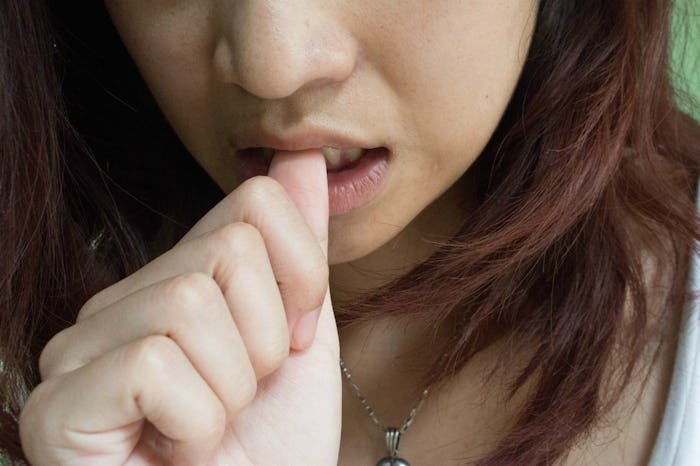If you've ever gnawed your fingernails down to the quick, or dealt with the sudden itch to run a marathon at 3:00 a.m., then you know a little about nervous energy. It can be an inefficient, and sometimes destructive, impulse. As the physical signs you have too much nervous energy prove, this particular kind of exuberance can show up in some weird and unwelcome ways.
Also known as excess energy, nervous energy is triggered by the body's fight or flight response, according to AnxietyCentre.com. Basically, when you're feeling stressed or anxious, the body get amped-up to take on an aggressor or run away. This is great if you're being chased by a bear, but not so great if you're stressed out about meeting a deadline at your office job. That energy has nowhere to go. Over time, the body can get hyper-stimulated by the release of stress hormones, resulting in an abundance of energy, as further explained by AnxietyCentre.com. Sometimes this energy shows up in the form of certain nervous tics or other physical symptoms.
So here are a few of the ways nervous energy may show up in your own body. If any of these symptoms are interfering with your daily life, or causing distress in any way, then consider speaking with a professional to help get these nervous tendencies under control.
1You Can't Sit Still
Feeling a constant, restless energy is one of the more common signs of anxiety, according to Calm Clinic. With this kind of restlessness, it's very difficult to just sit still and be calm for any length of time. You want to be up and moving, no matter what else is going on.
2You Add More To Your Packed Schedule
It's common to tackle new projects or tasks when you have nervous energy, even if your schedule can't spare another minute, according to AnxietyCentre.com. That energy has to go somewhere, so you decide to add more to your plate.
3You Crave Sugar
Craving sweets when you're already stressed is super common. "When we’re stressed out, we have a high level of a hormone called cortisol, and we crave sugar because if we eat some sugar, we will actually get another hormone called serotonin, which is calming and relaxing," said registered dietician Rebecca Scritchfield in HuffPost. "It’s just our body’s way of taking a chill pill."
4You Pace Back And Forth
Sometimes anxiety shows up in behaviors such as pacing back and forth, according to Healthline. This sort of movement may help relieve tension and anxiety on some level, so it's a potential outlet for that nervous energy.
5You Can't Sleep
It's way past bedtime, but you're busy scrolling deep through the weirdest parts of Instagram. It's common for people with anxiety issues to have trouble falling asleep, according to Psychology Today. Then you get to feel wired and tired at the same time, which is its own kind of annoying.
6You Shake Your Legs
The rest of your body may be still, but that right leg is doing an entire tap dance routine. "Anxiety can translate very directly into an unconscious leg-shaking," wrote Susan Krauss Whitbourne Ph.D. It's a way to blow off some of that excess energy, and you might not even be aware when it's happening.
7You Bite Your Lips
Actors can make lip-biting look cute or even sexy, but in real life it can be a more problematic habit. A body-focused repetitive behavior, lip biting is a common coping mechanism for anxiety, according to Medical News Today. But it can be a painful habit, especially if you happen to chew your lips until they bleed.
8You Fidget Constantly
Kids are constantly reminded to stop squirming, but plenty of people retain this habit well into adulthood. As it turns out, fidgeting may also be the result of anxious energy, according to VeryWellMind. Your body is just trying to relieve some of that intense tension.
9You Bite Your Nails
Stress, tension, or simple nervousness can cause many people to bite their nails, according to Psychology Today. It's a common habit that can result in dental damage or painful injuries to the fingers. As nail biting or any other habit reveals, the habits that stem from nervous energy can become problematic in their own right. As always, don't hesitate to seek help for this or any other habit that may affect your health.
